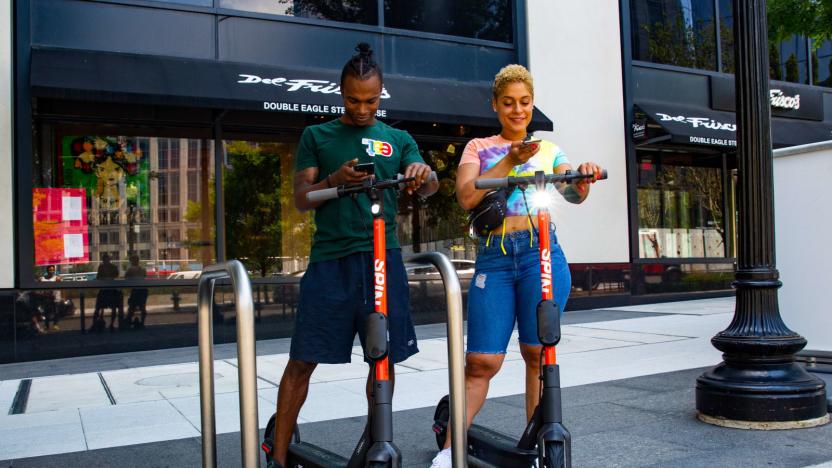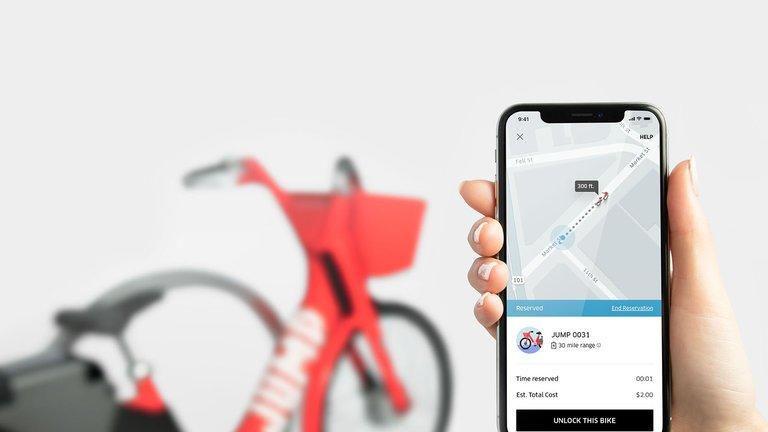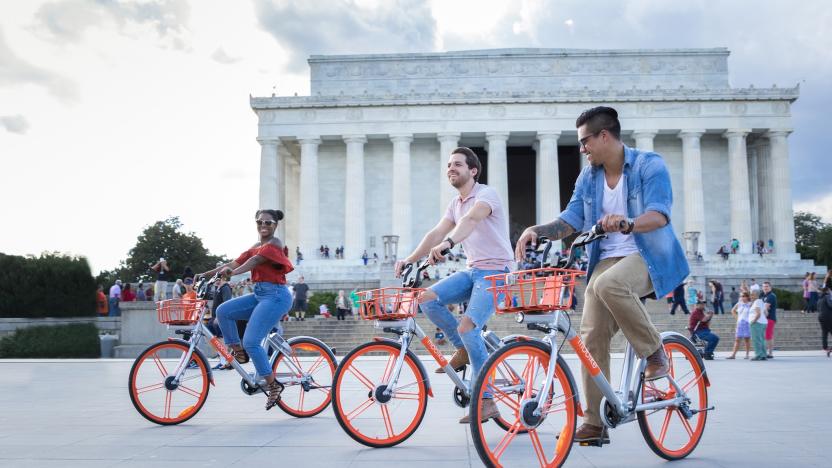dockless
Latest

Ford brings its Spin scooters to Germany this spring
Spin, the Ford-owned e-scooter company, is expanding its fleet into Europe. It will introduce dockless electric scooters in Cologne, Germany, this spring. The company plans to "explore opportunities" in Paris and the UK, too.

Spin's revamped e-scooters are coming to eight US cities
Spin, the e-scooter startup acquired by Ford, is rolling out its redesigned electric scooters and bringing them to more cities across the US. The new scooters have a larger frame with a wider and longer platform. They come with bigger, tubeless tires for better shock absorption, more intuitive bike-handle braking, a boosted rear drive for improved acceleration and security screws meant to cut down on tampering and vandalism. And with an extended battery life, they should travel up to 37.5 miles on a full charge.

Lyft renames its Bay Area bike-sharing program Bay Wheels
Today, Lyft is renaming its Bay Area bike share system. It's now Bay Wheels, no longer Ford GoBike. As part of the transition, the company is introducing new e-bikes with pedal assist for hills and the option to dock the bikes or lock them outside of a station. According to a press release, riders will be able to access the bikes with just two taps in the Lyft app.

Uber’s latest venture is a bike-sharing service in San Francisco
Uber's piloting a new service in San Francisco alongside dockless bike-sharing startup Jump. Uber Bike will let users rent one of Jump's 250 bikes, charging $2 for the first 30 minutes and an additional per-minute fee thereafter. Jump was granted a permit by the San Francisco Municipal Transportation Agency earlier this month, which made it the first company to operate a dockless bike-sharing program in the city. Jump's 250 bikes should launch around the city between now and March and the SFMTA may allow the company to release 250 more after nine months, depending on how things go. The permit was issued for 18 months, during which the SFMTA will evaluate the program and the public's response.

Mobike's dockless bike-sharing service comes to Washington, DC
Washington DC is one of the most bike-happy cities in America, with around five percent of commuters pedaling around the city each day. That's one of the reasons why Mobike, a company that has mostly been in China and Europe until now, is launching a pilot for the first dockless bike-sharing program in the capital. It's starting with 200 bikes in the pilot program for now, a pittance next to the millions it has in China, but plans to expand the program across the US if things go well.

The right and wrong ways to run apps without dock icons
I recently downloaded an app that I wanted to run without a dock icon. There wasn't a preference to run that way, but I remembered that there was a way to edit a file within each app's "bundle" (.app "files" are actually folders or packages). Sure enough, a little time on Google brought me to information about adding or changing the "LSUIElement" key in the app's Info.plist file. It also led me to Dockless, which is an app that automatically sets that key for you when you drag the app to Dockless' window. That seemed much safer than editing the file myself, so I downloaded Dockless, dragged the app to it and restarted the app. It crashed immediately and every time afterwards. I'm no math whiz, but I can put two and two together. I emailed the developer, who confirmed my suspicion that editing the app that way had broken code signing, a feature that Apple introduced in 10.5 and which is now an essential part of most current apps, including apps from the Mac App Store. The solution was simple: delete the app and re-download a clean copy from the Mac App Store. (Running Dockless again to "undo" the change was not enough in my experience.) Just for the sake of completeness, I tried Dock Dodger, another application designed to do the same thing. To the developer's credit, there is a disclaimer on their website that "you may get some strange behavior or find some features inaccessible" after using it. I made a copy of iCal and ran Dock Dodger on the copy. It ran without a dock icon, but it also refused to store my MobileMe password, meaning that my calendars would not sync via MobileMe. Lesson learned. Being able to coerce apps to run without a dock icon might have been something we could get away with in the past, but it was never a very good idea, and like Lando's deal with Darth Vader, it's getting worse all the time. Fortunately I've noticed more and more applications that give users a preference setting to turn off the dock icon. If app developers build this into their apps, the feature doesn't break code signing, and the apps will continue to function normally. So what should you do if you find an app that you want to run "dockless" that doesn't have a preference setting for it? Well, if you want to try one of the above apps (which I do not recommend), be sure to make a copy of the app, and try the changes on the copy. That way, if it doesn't work, you can trash the copy and still have your "clean" original. My recommendation is to contact the developer and ask (nicely) for them to consider adding the feature in a future version. Developers weigh new feature requests based on a number of different things, but user requests are an important part of that decision process. It may not be feasible for all applications, but if you don't ask, they'll never know it was a feature you wanted.



